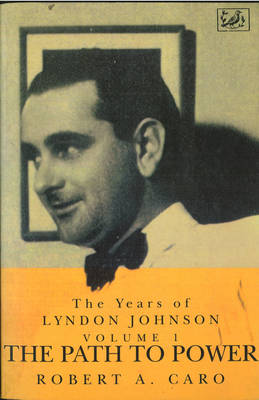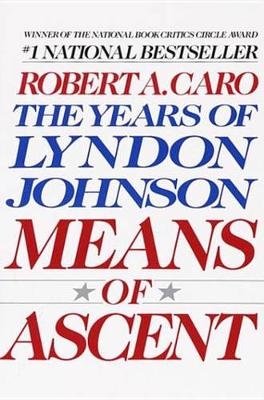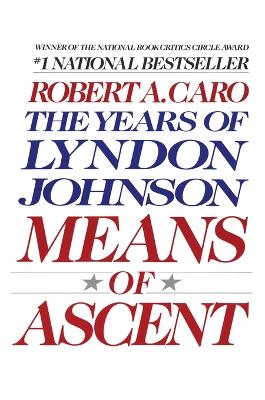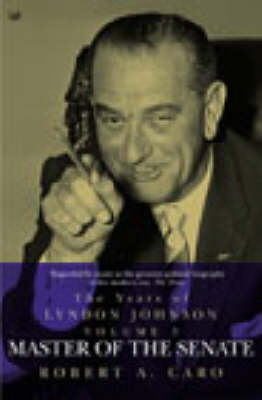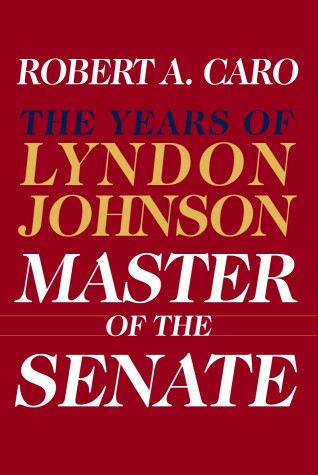The Years of Lyndon Johnson
7 primary works
Book 1
The first volume in Robert Caro's The Years of Lyndon Johnson, hailed as `the greatest biography of our era', this is the story of the rise to national power of a desperately poor young man from the Texas Hill Country.
Revealed in extraordinary detail is the genesis of that almost superhuman drive, energy and ambition which set LBJ apart.
Winner of the National Book Critics Circle Award for Biography, The Path to Power charts his boyhood through the years of the Depression to his debut as a Congressman, his heartbreaking defeat in his first race for the Senate and his attainment, nonetheless, at the age of 31 of the power for which he hungered.
In this riveting book we are shown more clearly than ever before the true nature of political genius.
Revealed in extraordinary detail is the genesis of that almost superhuman drive, energy and ambition which set LBJ apart.
Winner of the National Book Critics Circle Award for Biography, The Path to Power charts his boyhood through the years of the Depression to his debut as a Congressman, his heartbreaking defeat in his first race for the Senate and his attainment, nonetheless, at the age of 31 of the power for which he hungered.
In this riveting book we are shown more clearly than ever before the true nature of political genius.
Book 1
In "Means of Ascent", Caro covers the years 1941-48, years in the wilderness for Johnson, who had been devastatingly defeated for the Senate in 1941, but years of fascination for the biographer and for anyone interested in the more extreme grotesqueries of American politics. For this is the period when Lyndon Johnson and his wife Ladybird made themselves rich, Texas-style rich. And it is the period when Johnson won his first seat in the US Senate, in an election whose corruption was legendary even by Texas standards. Caro has tried to expose the details of Johnson's financial dealings, so long shrouded in secrecy, and the almost incredible true story of the 1948 Senate contest, a tale of local bosses, controlled votes, and stuffed and stolen ballot boxes. What he shows us is at once funny, horrifying and inevitable.
Book 2
In Means of Ascent, Book Two of The Years of Lyndon Johnson, Robert A. Caro brings alive Lyndon Johnson in his wilderness years.
Here, Johnson’s almost mythic personality—part genius, part behemoth, at once hotly emotional and icily calculating—is seen at its most nakedly ambitious. This multifaceted book carries the President-to-be from the aftermath of his devastating defeat in his 1941 campaign for the Senate-the despair it engendered in him, and the grueling test of his spirit that followed as political doors slammed shut-through his service in World War II (and his artful embellishment of his record) to the foundation of his fortune (and the actual facts behind the myth he created about it).
The culminating drama—the explosive heart of the book—is Caro’s illumination, based on extraordinarily detailed investigation, of one of the great political mysteries of the century. Having immersed himself in Johnson’s life and world, Caro is able to reveal the true story of the fiercely contested 1948 senatorial election, for years shrouded in rumor, which Johnson was not believed capable of winning, which he “had to” win or face certain political death, and which he did win-by 87 votes, the “87 votes that changed history.”
Telling that epic story “in riveting and eye-opening detail,” Caro returns to the American consciousness a magnificent lost hero. He focuses closely not only on Johnson, whom we see harnessing every last particle of his strategic brilliance and energy, but on Johnson’s “unbeatable” opponent, the beloved former Texas Governor Coke Stevenson, who embodied in his own life the myth of the cowboy knight and was himself a legend for his unfaltering integrity. And ultimately, as the political duel between the two men quickens—carrying with it all the confrontational and moral drama of the perfect Western—Caro makes us witness to a momentous turning point in American politics: the tragic last stand of the old politics versus the new—the politics of issue versus the politics of image, mass manipulation, money and electronic dazzle.
Here, Johnson’s almost mythic personality—part genius, part behemoth, at once hotly emotional and icily calculating—is seen at its most nakedly ambitious. This multifaceted book carries the President-to-be from the aftermath of his devastating defeat in his 1941 campaign for the Senate-the despair it engendered in him, and the grueling test of his spirit that followed as political doors slammed shut-through his service in World War II (and his artful embellishment of his record) to the foundation of his fortune (and the actual facts behind the myth he created about it).
The culminating drama—the explosive heart of the book—is Caro’s illumination, based on extraordinarily detailed investigation, of one of the great political mysteries of the century. Having immersed himself in Johnson’s life and world, Caro is able to reveal the true story of the fiercely contested 1948 senatorial election, for years shrouded in rumor, which Johnson was not believed capable of winning, which he “had to” win or face certain political death, and which he did win-by 87 votes, the “87 votes that changed history.”
Telling that epic story “in riveting and eye-opening detail,” Caro returns to the American consciousness a magnificent lost hero. He focuses closely not only on Johnson, whom we see harnessing every last particle of his strategic brilliance and energy, but on Johnson’s “unbeatable” opponent, the beloved former Texas Governor Coke Stevenson, who embodied in his own life the myth of the cowboy knight and was himself a legend for his unfaltering integrity. And ultimately, as the political duel between the two men quickens—carrying with it all the confrontational and moral drama of the perfect Western—Caro makes us witness to a momentous turning point in American politics: the tragic last stand of the old politics versus the new—the politics of issue versus the politics of image, mass manipulation, money and electronic dazzle.
Book 2
In Means of Ascent, Book Two of The Years of Lyndon Johnson, Robert A. Caro brings alive Lyndon Johnson in his wilderness years.
Here, Johnson’s almost mythic personality—part genius, part behemoth, at once hotly emotional and icily calculating—is seen at its most nakedly ambitious. This multifaceted book carries the President-to-be from the aftermath of his devastating defeat in his 1941 campaign for the Senate-the despair it engendered in him, and the grueling test of his spirit that followed as political doors slammed shut-through his service in World War II (and his artful embellishment of his record) to the foundation of his fortune (and the actual facts behind the myth he created about it).
The culminating drama—the explosive heart of the book—is Caro’s illumination, based on extraordinarily detailed investigation, of one of the great political mysteries of the century. Having immersed himself in Johnson’s life and world, Caro is able to reveal the true story of the fiercely contested 1948 senatorial election, for years shrouded in rumor, which Johnson was not believed capable of winning, which he “had to” win or face certain political death, and which he did win-by 87 votes, the “87 votes that changed history.”
Telling that epic story “in riveting and eye-opening detail,” Caro returns to the American consciousness a magnificent lost hero. He focuses closely not only on Johnson, whom we see harnessing every last particle of his strategic brilliance and energy, but on Johnson’s “unbeatable” opponent, the beloved former Texas Governor Coke Stevenson, who embodied in his own life the myth of the cowboy knight and was himself a legend for his unfaltering integrity. And ultimately, as the political duel between the two men quickens—carrying with it all the confrontational and moral drama of the perfect Western—Caro makes us witness to a momentous turning point in American politics: the tragic last stand of the old politics versus the new—the politics of issue versus the politics of image, mass manipulation, money and electronic dazzle.
Here, Johnson’s almost mythic personality—part genius, part behemoth, at once hotly emotional and icily calculating—is seen at its most nakedly ambitious. This multifaceted book carries the President-to-be from the aftermath of his devastating defeat in his 1941 campaign for the Senate-the despair it engendered in him, and the grueling test of his spirit that followed as political doors slammed shut-through his service in World War II (and his artful embellishment of his record) to the foundation of his fortune (and the actual facts behind the myth he created about it).
The culminating drama—the explosive heart of the book—is Caro’s illumination, based on extraordinarily detailed investigation, of one of the great political mysteries of the century. Having immersed himself in Johnson’s life and world, Caro is able to reveal the true story of the fiercely contested 1948 senatorial election, for years shrouded in rumor, which Johnson was not believed capable of winning, which he “had to” win or face certain political death, and which he did win-by 87 votes, the “87 votes that changed history.”
Telling that epic story “in riveting and eye-opening detail,” Caro returns to the American consciousness a magnificent lost hero. He focuses closely not only on Johnson, whom we see harnessing every last particle of his strategic brilliance and energy, but on Johnson’s “unbeatable” opponent, the beloved former Texas Governor Coke Stevenson, who embodied in his own life the myth of the cowboy knight and was himself a legend for his unfaltering integrity. And ultimately, as the political duel between the two men quickens—carrying with it all the confrontational and moral drama of the perfect Western—Caro makes us witness to a momentous turning point in American politics: the tragic last stand of the old politics versus the new—the politics of issue versus the politics of image, mass manipulation, money and electronic dazzle.
Book 3
Hailed as 'the greatest biography of our era' (The Times) this is the third part of Robert Caro's multi-award-winning best-selling work on American President Lyndon Johnson.
Master of the Senate takes Johnson's story through one of its most remarkable periods: his twelve years, from 1949 through to 1960, in the United States Senate. Once the most august and revered body in politics, by the time Johnson arrived the Senate had become a parody of itself and an obstacle that for decades had blocked desperately needed liberal legislation.
Caro shows how Johnson's brilliance, charm, and ruthlessness enabled him to become the youngest and most powerful Majority Leader in history and how he used his incomparable legislative genius -seducing both Northern liberals and Southern conservatives -to pass the first Civil Rights legislation since Reconstruction.
Brilliantly weaving rich detail into a gripping narrative, Caro gives us both a galvanizing portrait of Johnson himself and a definitive and revelatory study of the workings of legislative power
Master of the Senate takes Johnson's story through one of its most remarkable periods: his twelve years, from 1949 through to 1960, in the United States Senate. Once the most august and revered body in politics, by the time Johnson arrived the Senate had become a parody of itself and an obstacle that for decades had blocked desperately needed liberal legislation.
Caro shows how Johnson's brilliance, charm, and ruthlessness enabled him to become the youngest and most powerful Majority Leader in history and how he used his incomparable legislative genius -seducing both Northern liberals and Southern conservatives -to pass the first Civil Rights legislation since Reconstruction.
Brilliantly weaving rich detail into a gripping narrative, Caro gives us both a galvanizing portrait of Johnson himself and a definitive and revelatory study of the workings of legislative power
Book 3
Master of the Senate, Book Three of The Years of Lyndon Johnson, carries Johnson’s story through one of its most remarkable periods: his twelve years, from 1949 to 1960, in the United States Senate. At the heart of the book is its unprecedented revelation of how legislative power works in America, how the Senate works, and how Johnson, in his ascent to the presidency, mastered the Senate as no political leader before him had ever done.
It was during these years that all Johnson’s experience—from his Texas Hill Country boyhood to his passionate representation in Congress of his hardscrabble constituents to his tireless construction of a political machine—came to fruition. Caro introduces the story with a dramatic account of the Senate itself: how Daniel Webster, Henry Clay, and John C. Calhoun had made it the center of governmental energy, the forum in which the great issues of the country were thrashed out. And how, by the time Johnson arrived, it had dwindled into a body that merely responded to executive initiatives, all but impervious to the forces of change. Caro anatomizes the genius for political strategy and tactics by which, in an institution that had made the seniority system all-powerful for a century and more, Johnson became Majority Leader after only a single term-the youngest and greatest Senate Leader in our history; how he manipulated the Senate’s hallowed rules and customs and the weaknesses and strengths of his colleagues to change the “unchangeable” Senate from a loose confederation of sovereign senators to a whirring legislative machine under his own iron-fisted control.
Caro demonstrates how Johnson’s political genius enabled him to reconcile the unreconcilable: to retain the support of the southerners who controlled the Senate while earning the trust—or at least the cooperation—of the liberals, led by Paul Douglas and Hubert Humphrey, without whom he could not achieve his goal of winning the presidency. He shows the dark side of Johnson’s ambition: how he proved his loyalty to the great oil barons who had financed his rise to power by ruthlessly destroying the career of the New Dealer who was in charge of regulating them, Federal Power Commission Chairman Leland Olds. And we watch him achieve the impossible: convincing southerners that although he was firmly in their camp as the anointed successor to their leader, Richard Russell, it was essential that they allow him to make some progress toward civil rights. In a breathtaking tour de force, Caro details Johnson’s amazing triumph in maneuvering to passage the first civil rights legislation since 1875.
Master of the Senate, told with an abundance of rich detail that could only have come from Caro’s peerless research, is both a galvanizing portrait of the man himself—the titan of Capital Hill, volcanic, mesmerizing—and a definitive and revelatory study of the workings and personal and legislative power.
It was during these years that all Johnson’s experience—from his Texas Hill Country boyhood to his passionate representation in Congress of his hardscrabble constituents to his tireless construction of a political machine—came to fruition. Caro introduces the story with a dramatic account of the Senate itself: how Daniel Webster, Henry Clay, and John C. Calhoun had made it the center of governmental energy, the forum in which the great issues of the country were thrashed out. And how, by the time Johnson arrived, it had dwindled into a body that merely responded to executive initiatives, all but impervious to the forces of change. Caro anatomizes the genius for political strategy and tactics by which, in an institution that had made the seniority system all-powerful for a century and more, Johnson became Majority Leader after only a single term-the youngest and greatest Senate Leader in our history; how he manipulated the Senate’s hallowed rules and customs and the weaknesses and strengths of his colleagues to change the “unchangeable” Senate from a loose confederation of sovereign senators to a whirring legislative machine under his own iron-fisted control.
Caro demonstrates how Johnson’s political genius enabled him to reconcile the unreconcilable: to retain the support of the southerners who controlled the Senate while earning the trust—or at least the cooperation—of the liberals, led by Paul Douglas and Hubert Humphrey, without whom he could not achieve his goal of winning the presidency. He shows the dark side of Johnson’s ambition: how he proved his loyalty to the great oil barons who had financed his rise to power by ruthlessly destroying the career of the New Dealer who was in charge of regulating them, Federal Power Commission Chairman Leland Olds. And we watch him achieve the impossible: convincing southerners that although he was firmly in their camp as the anointed successor to their leader, Richard Russell, it was essential that they allow him to make some progress toward civil rights. In a breathtaking tour de force, Caro details Johnson’s amazing triumph in maneuvering to passage the first civil rights legislation since 1875.
Master of the Senate, told with an abundance of rich detail that could only have come from Caro’s peerless research, is both a galvanizing portrait of the man himself—the titan of Capital Hill, volcanic, mesmerizing—and a definitive and revelatory study of the workings and personal and legislative power.
Book 4
The fourth volume of Robert Caro's monumental work on American President Lyndon Johnson spans the years 1958 to 1964, arguably the most crucial years in the life of Johnson and pivotal years for American history. This era saw some of the most frustrating moments of Johnson's career, but also some of his most triumphant. His battle with the Kennedy brothers over the 1960 Democratic nomination for president was a bitter one, and the ensuing years of Johnson's vice-presidency were marked with humiliation. But, thrust into power following the assassination of J. F. Kennedy, Johnson grasped the presidential role with unprecedented skill. Caro provides a fresh perspective on the extremely well-document event of the Kennedy assassination from the singular viewpoint of Lyndon Johnson, and penetrates deep into what it was like for Johnson to assume a position of such power at a time of national crisis. "The Passage of Power" documents Johnson's extraordinary early presidency, forcing previously abandoned bills on the budget and civil rights through an uncooperative Congress and striving to achieve what he saw to be the highest standard of office.
This is a biography of a man and of his times. Caro shows a delicacy of touch and a profoundness of insight into the state of a nation under the hand of a political master. Collectively these volumes constitute a major history of America in the first three-quarters of the twentieth century.
This is a biography of a man and of his times. Caro shows a delicacy of touch and a profoundness of insight into the state of a nation under the hand of a political master. Collectively these volumes constitute a major history of America in the first three-quarters of the twentieth century.
